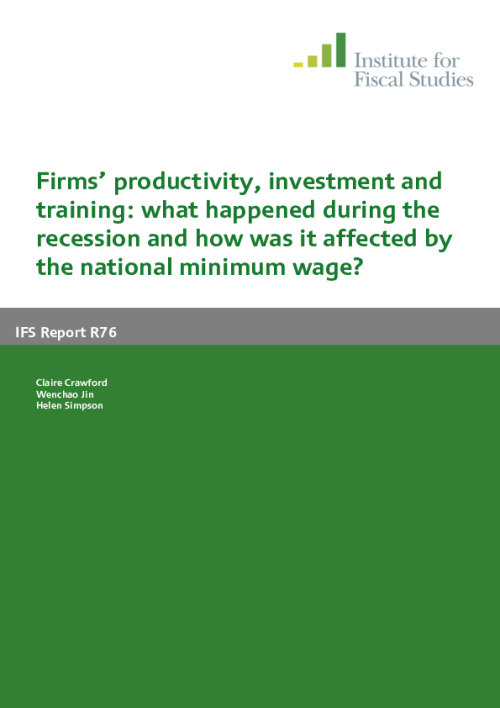Downloads

r76.pdf
PDF | 883.89 KB
In 2008–09, the UK experienced its deepest recession since the Second World War. One notable feature of this recession was, however, the resilience of employment, which fell by just 2.1% at a time when GDP fell by 6.3%. This suggests that firms may have been trying to weather the recession by holding on to their workers and reducing their hours, rather than making them redundant. Such behaviour is sometimes thought to indicate ‘labour hoarding’.
This report uses business data to document what happened to a variety of indicators of labour hoarding, as well as investment and training, over the course of the 2008–09 recession. In particular, it shows how these patterns vary amongst different types of firms, including by size and coverage of the National Minimum Wage (NMW) (i.e. the proportion of workers who are paid at or below this level). The report is associated with the Low Pay Commission Report 2013 and is funded by the Low Pay Commission.Authors

Helen Simpson

Research Fellow University College London
Claire is a Research Fellow at IFS, working on the determinants and consequences of participation in childcare and education for parents and children.

Research Associate
Wenchao is an Assistant Professor at the University of Sussex and an IFS Research Associate.
Report details
- DOI
- 10.1920/re.ifs.2013.0076
- Publisher
- Institute for Fiscal Studies
Suggested citation
C, Crawford and W, Jin and H, Simpson. (2013). Firms' productivity, investment and training, what happened during the recession and how was it affected by the national minimum wage?. London: Institute for Fiscal Studies. Available at: https://ifs.org.uk/publications/firms-productivity-investment-and-training-what-happened-during-recession-and-how-was (accessed: 30 June 2024).
More from IFS
Understand this issue

Election Special: Your questions answered
27 June 2024

What is the two-child limit in benefits?
27 June 2024

Election Special: The big issues politicians haven't spoken about
25 June 2024
Policy analysis

How do the last five years measure up on levelling up?
19 June 2024

How would the parties’ tax and spending plans affect Scotland and Wales?
28 June 2024

What are the parties’ plans for benefits and taxes?
24 June 2024
Academic research

The impact of labour demand shocks when occupational labour supplies are heterogeneous
28 June 2024

Labour market inequality and the changing life cycle profile of male and female wages
15 April 2024

Interpreting cohort profiles of lifecycle earnings volatility
15 April 2024